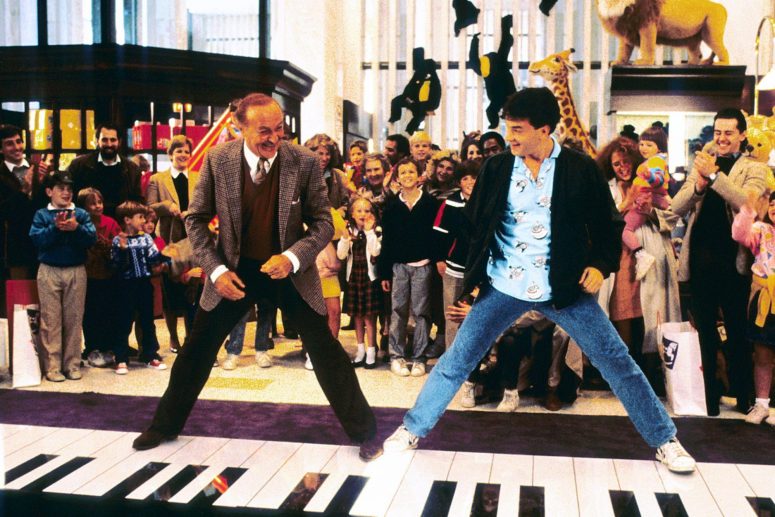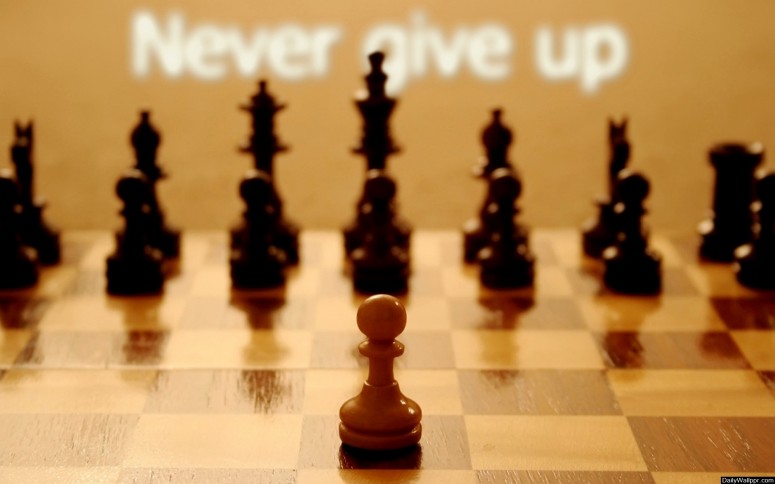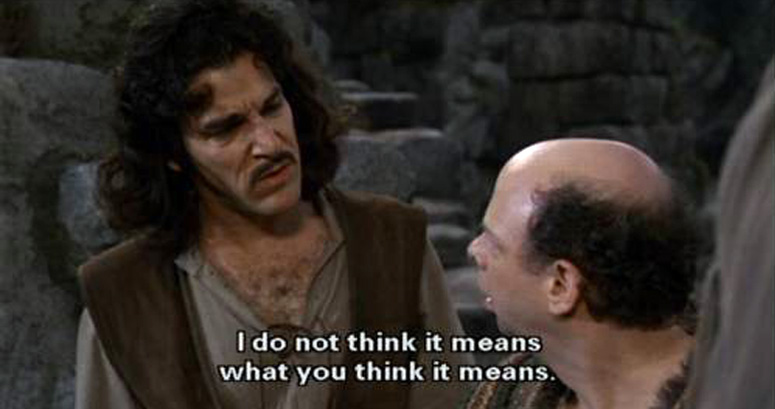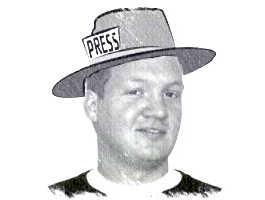
Getting rich in five years is one thing. But living richly involves a lot more than just money.
Indeed, many people are rich in cash but poor in assets, broke on time, impoverished in relationships, destitute in health, and underprivileged in experiences and ongoing education. Of course, the inverse is true too. Poor people can be rich in many other areas that matter.
What can each of us do, then, to ensure we’re living richly in most, if not all, major aspects of life, regardless of income? While I don’t have all the answers, this is what I know for sure: Continue reading…

Courtesy 20th Century Fox
$375 an hour is a lot of money. It was even more money 20 years ago when a bougie investment bank paid me that to share my honest opinion with some of its biggest customers.
Many people don’t know this, but I got my start in writing covering video games of all things. It was the ideal subject for an early twenty-something like me. I threw myself into the “work,” was one of the most prolific tech bloggers for AOL (aka America On-Line), and had a blast attended game conferences, interacting with readers, and crafting sentences for a living. It was a lot like Tom Hanks character from Big. I was getting paid to play with toys and critique commercial art.
The pay wasn’t great. But when paired with magazine freelancing, it was enough to support my small, apartment-living family. I’m smiling right now just thinking about it. Continue reading…

Courtesy Warner Bros.
I’ve been writing full-time on a professional basis for almost two decades. In that time, I’ve written two books, hundreds or reports, and thousands of articles.
To publish that amount of work, I’ve also committed tens of thousands of mistakes. Maybe more. My last book alone contained thousands of errors after my editor bled all over it. On top of that, I was born with bad diction, and am subjected to nasty hate mail after some of my mistakes.
Why am I telling you this?
Because in both life and writing, mistakes are an everyday thing. In fact, the latter happen every minute. That’s because language and communication are incredibly complex, even for professionals like me who get paid to write fewer mistakes than you do. The sooner you accept, if not embrace, mistakes, the better writer you’ll be. Continue reading…

After a decade of self employment, I’ve been told “no” several thousand times. I have records. For the same period, I’ve been told “yes” a few dozen times. Fewer than a hundred. I have records of that, too.
As you can tell, I–like most humans, salesmen, and business owners–experience rejection more than acceptance. Unlike many people, however, I don’t let that discourage me as a proprietor. But I almost did once.
Continue reading…

You’d be amazed at the number of experts willing to give free advice.
There are countless stories of unknown people looking up some of the world’s brightest minds, and then cold calling, cold emailing, or cold messaging them on social media to get a favorable response. Although the success rate is usually low, it’s actually higher than you think. Because of this, reaching out to expert strangers is often worth it.
The success rate for getting free advice among friends, family, and former associates, however, is shockingly high and always worth doing. In fact, you’re probably leaving tens of thousands of dollars on the table every year in free consulting and coaching by not reaching out and asking for help. For example, you could easily get guidance on your latest idea, work project, side hustle, hobby, or personal problem.
But you have to ask. Continue reading…

Courtesy Shutterstock
My advice: Spend almost as much time asking people if you can write for them as you do actually writing for them. In the early days, I spent upwards of half of my time asking editors if I can write for them. Most ignored me. Several rejected me. But a handful said yes. In other words, being a freelance writer requires a lot of hustle. That lessens the longer you’re in the game and the more “free” referral work you get as you build your reputation. But even now after years of bylines I have to hustle to ask people if I can write for them. Good luck!

creative commons
Craig Weiler has the answer:
You have one set of teeth, one set of knees, one set of lungs and one back. If you don’t take care of them, you can’t re-boot. You can get knee replacement surgery and you can get your teeth capped and wear dentures, or get new lungs, but it’s not the same as your originals. The back is much more tricky and if you damage it enough you’re never coming back from it.
You have one set of hands and feet. They are irreplaceable as is your brain. So if you damage them you’re never coming back from it.
Your body, in other words, is a one-off. You will never have another one as long as you live. If you start taking good care of it and you’re mindful in your 20’s, you’ll be far healthier and happier in your 50’s and beyond.”

Courtesy Shutterstock
This is a sample lesson from my new employee training company, Power Space.
Admitting that you’re stuck is a hard thing to do. Asking for help is even harder, especially for the more prideful souls among us, of which there is no shortage. On top of that, many of us refrain from asking for help because we think doing so is imposing or causes unwanted work for others.
Nothing could be further from the truth. While it’s true that asking for help sometimes creates more work for others, we do not get to decide what is unwelcome work for others. Predicting or telling ourselves that is an unhelpful projection. That may be true some of the time, but research shows that humans are usually willing to help. As social creatures, it’s in our DNA and has been for tens of thousands of years.
But to get the help we need, either personally or professionally, we must ask. We must speak up. No one else will do that for us and, in fact, it’s no one else’s job except ours alone. Waiting for someone else to ask on our behalf is not only unfair, it prolongs our frustration, delays fulfillment, and saps motivation. Continue reading…

Nina Matthews
If you insist on setting 5, 10, or 30 year goals in life, you’re gonna have a bad time.
The reason: Long-terms goals are mostly arbitrary and futile. Since life is full of surprise, setting specific expectations for it largely results in a feeling of failure.
In other words, “Don’t aim at success,” writes Viktor Frankl in his seminal Man’s Search For Meaning. “The more you aim at it and make it a target, the more you are going to miss it.”
This has certainly been the case in my life. Continue reading…

I graduated from college at a time when “Casual Fridays” were a thing. This was before Silicon Valley established the “casual everydays” that most offices now enjoy—hoodies, jeans, t-shirts, and even activewear and joggers in some cases.
As a senior, I was invited to interview with a large national company that was coming to campus. I wasn’t particularly fond of the company, but I was flattered they had reviewed my resume and wanted to speak to me (after graduating, I would forgo employment altogether to work for myself, but that’s another story).
When the interview time came, I entered a designated office on campus and met a recruiter in his mid 40s under drab fluorescent lighting. He didn’t look particularly happy. In fact, he looked rather miserable. Obviously would rather be home with his family than interviewing some undergrad like me in some far away city. Continue reading…

Me hiking the Inca Trail
Here’s something you might not know about my work as a writer: 30-40% of my time is spent asking people if I can write for them, while the remaining 60-70% is spent on actually writing.
In other words, I’m either a writer who knows how to sell or a salesman who knows how to write. Consequently, I would’t have survived the past 15 years if I hadn’t asked thousands of people each year to let me write for them. I would have wilted long ago had I listened to the few rouge naysayers that rudely tell me to get lost sometimes.
Case in point: of the hundreds of emails I send on a monthly basis, the vast majority are ignored. Continue reading…

Blake Snow
When it comes to increasing both your output and your impact, here’s how to work smarter instead of harder.
For Entrepreneur—If there’s one thing I learned while researching and writing my first book, Log Off: How to Stay Connected after Disconnecting, it’s how to get more done in less time.
For the first five years as a self-employed writer, I passionately and excitedly burned the midnight oil, thinking the act would get me ahead. While it certainly helped to cut my teeth and quicken my understanding of the craft, in hindsight I spent much of that time with my head down, spinning my wheels in the mud, and failing to see bigger ideas and opportunities.
That is until my “Montana Moment,” a life-changing and completely off-the-grid vacation in Big Sky Country that upended and improved my relationship to work in more ways than one. Since that fateful week, I’ve enjoyed record personal, professional, and social growth. But only because I radically changed my underlying approach and motivations for work.
There are as follows: Continue reading…
Paul Ford shared some inspiring advice recently on being polite. He writes:
“Here’s a polite person’s trick, one that has never failed me… When you are at a party and are thrust into conversation with someone, see how long you can hold off before talking about what they do for a living. And when that painful lull arrives, just ask the other person what they do, and right after they tell you, say: ‘Wow. That sounds hard.'”
This works because everyone believes their job is difficult, Ford says, which is actually true when you consider their circumstances. “People silently struggle from all kinds of terrible things,” he continues. “They suffer from depression, ambition, substance abuse, and pretension. They suffer from family tragedy, Ivy-League educations, and self-loathing. They suffer from failing marriages, physical pain, and publishing.
“The good thing about politeness is that you can treat these people exactly the same. And then wait to see what happens. You don’t have to have an opinion. You don’t need to make a judgment.”
You just need to care, he concludes. You can start by looking others in the eye and asking their name with a smile and firm handshake. Then keep it up over time to ensure your politeness is enduring. After all, fleeting politeness is forgettable, Ford says. Lasting politeness is memorable and makes an impact.

20th Century Fox
Dan Waldschmidt thinks “faking it til you make it” is horrible advice.
But the catchphrase doesn’t mean what Waldshmidt thinks it means (spoken in my best Inigo Montoya accent). A quick Wikipedia search would have informed him that “faking it til you make it” means imitating confidence until you find real confidence—not stretching truth, bending rules, or denying reality, like the columnist mistakenly believes it means.
The first commenter on his syndicated post said it best: “‘Faking’ doesn’t mean “lying.’ It means faking that you are confident, self-assured, knowledgeable—when you, in fact, you’re not. It is excellent advice and helped me overcome many fears and doubts.” Or as Amy Cuddy says, “Fake it ’till you become it.”
Hear, hear! I, too, have faked my way to becoming a responsible adult, marketable guy, husband of one, and father of five. For me, the catchphrase is easily one of the top 10 pieces of advice on finding success.
 Since first subscribing to the daily paper this summer, I’ve been exposed to more Dear Abby columns than a 1950s trophy wife. The last one I read was horribly political, so I decided to guide the advice-seeker myself. Here goes:
Since first subscribing to the daily paper this summer, I’ve been exposed to more Dear Abby columns than a 1950s trophy wife. The last one I read was horribly political, so I decided to guide the advice-seeker myself. Here goes:
Dear Smooth Harold: My husband wanted to postpone having children until we were more financially secure. But I really wanted a baby, so he agreed, though only after I promised to return to work once the baby was born. That was a year ago. We now have a wonderful 2-month-old, and since “Avery” cam along, I realize how important it is for me to be at home with her. My husband disagrees. he says we need my salary in order to meet our financial obligations, and he is angry and upset that I won’t return to work. But I think there’s nothing as important as the nurturing a mother give her child. Who’s right?—R.F., Southern California
My reply:
Dear R.F.: Why on Earth would you ask me, a complete stranger, such an important question without knowing my background first? I could be a baby-snatcher for all you know, or completely against everything you believe in! But alas, perhaps you’re at your wits end and have no one to confide in. If that’s the case and you don’t feel comfortable anonymously researching different opinions online or posting to a message board, then I’ll indulge you. And I assure you I’m neither a baby-snatcher nor a posturing moral hypocrite. Continue reading…
In an effort to be a better human being while attempting to do what countless others have done for me, I’m launching two new social features on Smooth Harold. The first is the Smooth Harold Helpdesk. If you have a specific question you think I might be able to answer (business, web, personal, etc), don’t hesitate to ask via email, phone, or in person. I’ll usually respond same day when possible and free of charge. If I don’t know the answer, chances are I can refer you to someone who does. And no, this isn’t quid pro quo (really), it’s just a genuine attempt to share the little that I’ve learned from talking with people smarter than me, reading good books, and seeing what sticks.
The second offering is perhaps an extension of the first; it’s an open invitation to share lunch with any one either living in or visiting the greater Salt Lake area regardless if I know you personally or not. I remember a little over a year ago being down and out in business. I had just become a first-time father and hadn’t taken home a paycheck in over three months due to slow sales. Swallowing my pride, I asked an individual whom I respected but didn’t know if he’d be willing to go to lunch and answer some of my questions. It was one of the most helpfully and motivational experiences I’ve had as an entrepreneur in progress and was just the antidote I needed to keep going. (Thanks, Josh!) All you have to do is ask, and there are plenty of other people out there willing to do the same. So have your people call my people; we’ll do lunch! Of course, I don’t have an entourage of people, so you can just contact me or have your entourage contact me.
See the updated sidebar for complete details on both.














 Since first subscribing to the
Since first subscribing to the